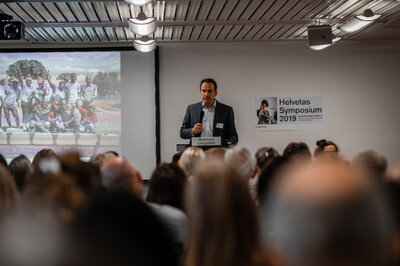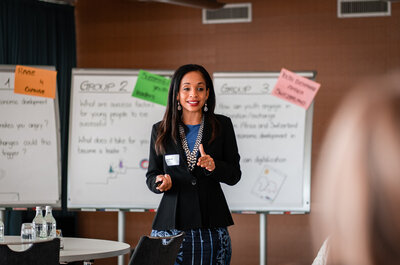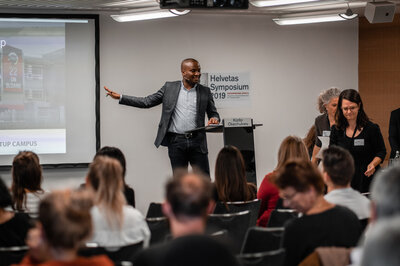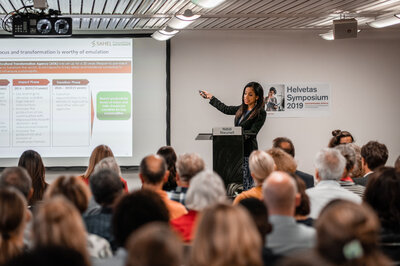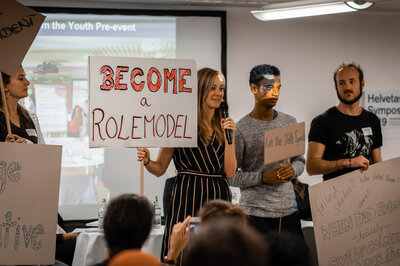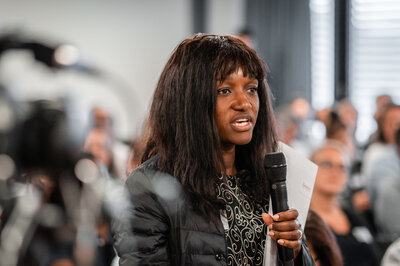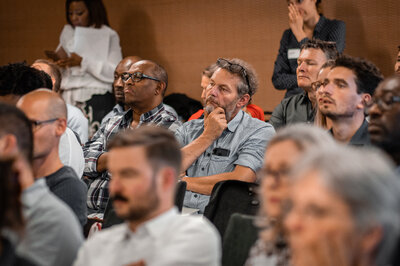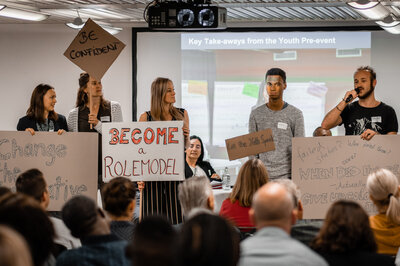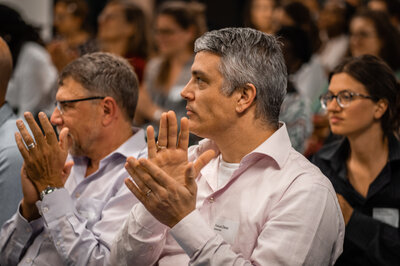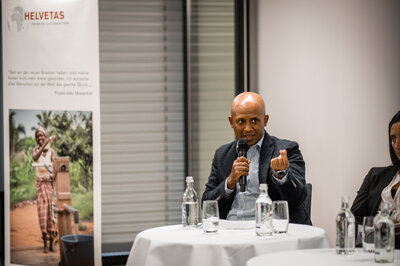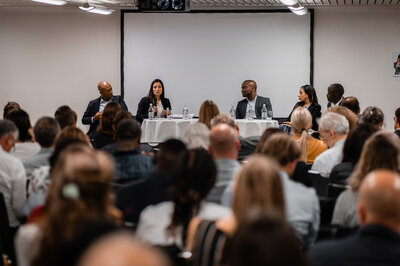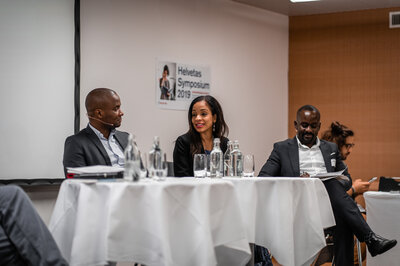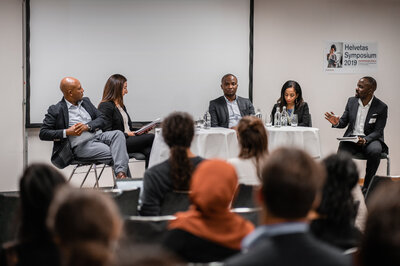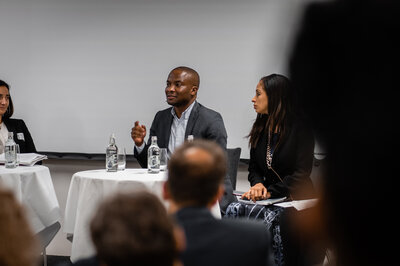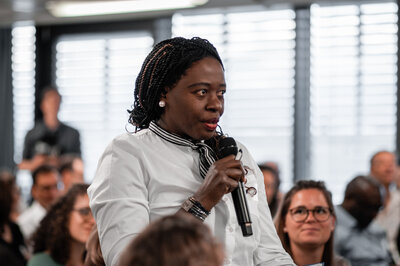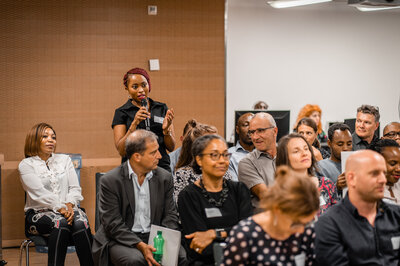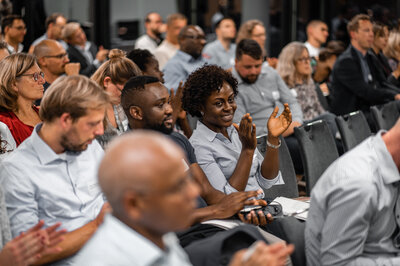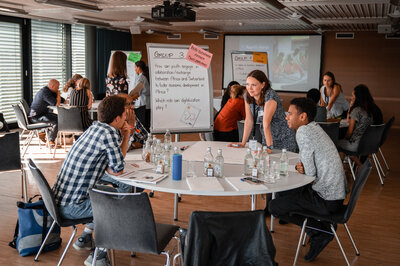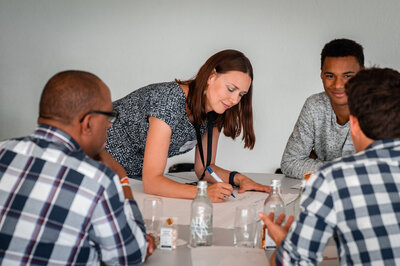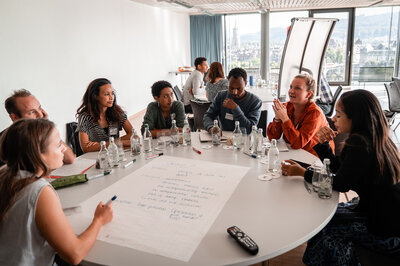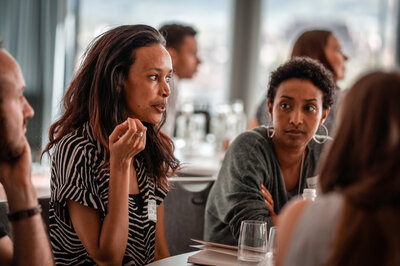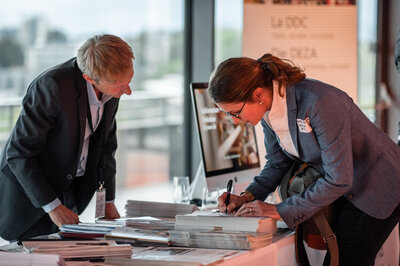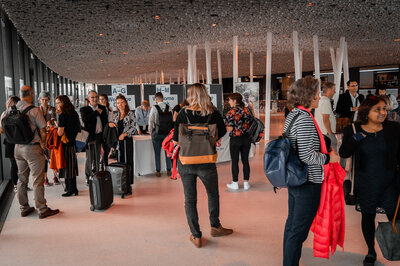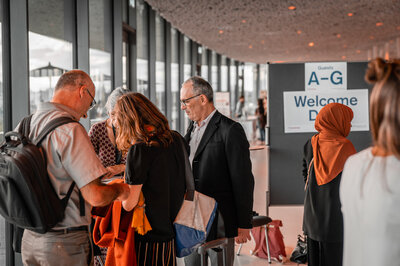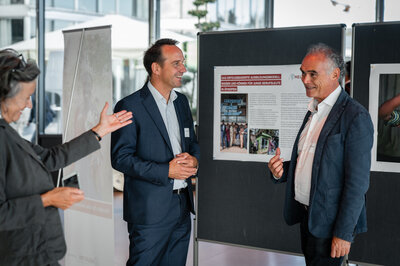The next Symposium will be held in September 2021.
The venue was a buzz with over 150 participants. Melchior Lengsfeld, Executive Director Helvetas, pointed out that with an average annual GDP of 5% in Sub-Saharan Africa, one of the fastest rate of urbanization, and a potentially fast-growing middle class – Africa is in the middle of a transition. This makes developmentalists wonder if the right things are being done. “It’s time for fresh ideas,” he said as he opened the symposium ‘Enterprising Africa – perspectives for economic development for a young population’.
For those pressed for time, below are some of the impressions of the event. At the end of the article, you can also find presentations and Discussion Paper downloads.
The Symposium Highlights
- Change the Narrative – a pressing need
Keynote speaker Ndidi Nwuneli was one of the Global Leaders for Tomorrow at the World Economic Forum and is the author of the book: Social Innovation in Africa (2016). She is also the co-founder and managing partner of Sahel Consulting, co-founder of AACE and the founder of LEAP.
In her presentation, she showed one particular slide – that of a of a malnourished, sunken eyed child. “This is what you usually see in connection with Africa. That’s not always true,” she said. “We need to change the narrative.” She strongly urged the audience to see and show the other side of Africa – one which shares positive stories of entrepreneurship. One that talks of resources that are an asset, and of youth that is entrepreneurial and ready to take on leadership roles.
- Job-creation & Informal and Formal Economies
The informal economies and formal economies work closely – often the informal economies support the formal economy with services, flexible and surplus labor. Whatever the area of work, it requires people to do a job – and do it right.
Ndidi stated the need to invest in education with a purpose, to “improve curricula so that education meets labor market needs". She reinforced that fact that there needs to be a shift in mindset towards education. Children should want to study agriculture not because they are too poor to afford any other education, but to become wealthy and self-reliant “agri-preneurs”. “We need to generate talent, change mindsets and source locally for inclusive and sustainable change,” she said.
Keynote speaker Kizito Okechukwu is the Executive Head and co-chairperson of Generation Entrepreneurship Network Africa 22 On Sloane – Africa’s largest start-up campus based in Johannesburg. He is also the executive head of SEA Africa, a research and development firm focused on linking businesses to African markets.
He pointed out that informal economies constitute some 80% of the African economic sector. "If you have an idea and want to start a business in Africa, do market research first and search for reliable partners - but do not pay bribe, you will never be able to get out of it,” said Kizito, presenting examples of startups in the informal sector.
He explained that to further grow the informal sector in Africa and ensure job creation and entrepreneurship, one would need to have a certain security of tenure, access to capital, improved skills, use of technology, and a rethink on part of big supply chains. The main message was to provide a technological disruption where the informal sector can link in to provide scale – matching labour and market needs.
Zenebe Uraguchi, Helvetas
- Infrastructure: a road to self-dependence
“We are blessed with agricultural possibilities, yet our food imports are high. Our population is malnourished! It is cheaper to bring potatoes from the UK than from remote rural Nigeria to the capital. Ideally, multinationals, but also local companies should have to source locally - secure sustainable supply chain, traceable for the customers. Get rid of your ignorance and support the locals. Make Africa a level playing ground – not a dumping ground,” she said in a determined tone.
Her message is to invest in infrastructure. There is a need for simple, low cost, demand-driven technology in the agriculture, food transport and storage sectors. This demand needs to be filled with skilled workers, who have the relevant training to make an impact towards self-sustenance – and employment!
Through her organizations, Ndidi has shaped agricultural strategy and policy in West Africa for a range of clients in the public, private and nonprofit sectors, and is working on value chains for smallholder farmers in West Africa.
- Governance and leadership
The audience members brought up the need for strong leaders and a functional and corruption-free government. "We need real leaders, not rulers,” said Ndidi, and referred to the work done via LEAP Africa to equip a new cadre of young leaders in the country.
During the panel discussion, Zenebe Uraguchi, Programme Coordinator, East and Southeast Europe, Senior Advisor, Sustainable & Inclusive Economies at Helvetas said, “Governance is an important yet challenging issue globally. Still, there are bright spots in Africa. Not everything is doom and gloom. Some examples are: the health outcomes in Ethiopia, gender equality in Rwanda, decentralization in Ghana, financial inclusion in Kenya, and education in Senegal.” He adds, “These examples are those in transitional change. To move from here to transformation is not just the responsibility of the public sector – it’s also private sector and civil society that needs to take this towards sustainable change.”
Along with Zenebe, who brings along multi-country experience as a developmental economist, and the two keynote speakers, Maria Prieto, Employment and Future of Work and Employment Specialist with the International Labour Organization (ILO) was also a panelist at the Symposium.
Regarding ILO's attempts to ensure social justice and access to decent work in these changing times, Maria says, “Governance goes beyond governments. For ILO, the issue of including in governance, the two main powers in a country are: labor and capital. Their inclusion in the discussion contributes to a sustainability.”
Maria Prieto, International Labour Organization (ILO)
She continues, “A global commission was established with many country heads; and after many researches and studies a ‘Human Centered Agenda’ has been recommended.”
She questions: “The earlier path of a normal person of holding 2-10 jobs over a lifetime is challenged. Today’s youth comes into a labor market holding 10 jobs simultaneously. How do you then affiliate your workers in to associations that protect them?” Maria adds, “A recent declaration in the ILO makes a call to action to 187 member states to apply the Human Centered Agenda that includes youth, upgrading skills, multiple jobs. The approach acknowledges the difference in the labor market and the need of an adaptation in the governance.”
She concludes: “The ILO recommends a lifelong learning approach, which is a strategy that’s already implemented in developed economies. The idea is to attack the mismatch of skill and labor.
- The voice of the youth should be heard
Over 60% of the African population is under 25 years of age. This youth is a bank of energy and resources that can be accessed to create a positive economy. A brief presentation by the under-30 participants, who attended the Youth-Pre-Event showed that the African youth needs role models. They need to be more confident. They believe that the youth can change Africa through post-harvest agricultural businesses. And most importantly, they need funding for ideas arising within enterprising Africa in order to change the narrative.
The audience was a mix of Africans living and/or studying in Switzerland, and adults who worked with the different NGOs, Swiss universities, foundations, consulting and funding organizations, and the media.
Focusing on how Africa's economic potential can be unleashed, which actors will be crucial in this, and what role education, entrepreneurship, and business skills should play together – the symposium was moderated by Arnold Kawuba, Regional Lead Partner Engagement Africa DSM.
“Change the Narrative. Leave a legacy” – that was the concluding message that resounded at the Symposium in Bern on October 1, 2019.
You can download the presentations and discussion paper:
-
Symposium FlyerPDF (0.53 MB)
-
Ndidi NwuneliPDF (5.25 MB)
-
Kizito OkechukwuPDF (1.39 MB)
-
Arising Africa Challenges and Perspectives for a Young Population by Geert van Dok and Zenebe B. UraguchiPDF (2.45 MB)
-
Aufbruch in Afrika: Herausforderungen und Perspektiven fuer eine junge Bevoelkerung von Geert van Dok und Zenebe B. UraguchiPDF (2.42 MB)






